
The Easybeats were an Australian rock band which formed in Sydney in late 1964. They are best known for their 1966 hit single "Friday on My Mind", which is regarded as the first Australian rock song to achieve international success; Rolling Stone described it as "the first international victory for Oz rock". One of the most popular and successful bands in the country, they were one of the few Australian bands of their time to foreground their original material; their first album Easy (1965) was one of the earliest Australian rock albums featuring all original songs.

George Redburn Young was an Australian musician, songwriter and record producer. He was a founding member of the bands The Easybeats and Flash and the Pan, and was one-half of the songwriting and production duo Vanda & Young with his long-time musical collaborator Harry Vanda, with whom he co-wrote the international hits "Friday on My Mind" and "Love Is in the Air", the latter recorded by John Paul Young.
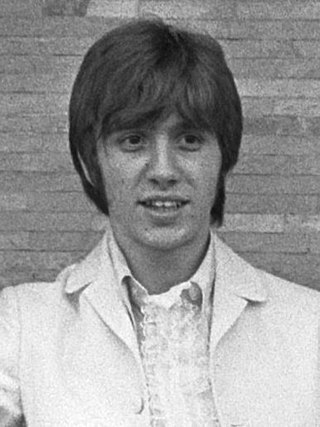
Stephen Carlton Wright was an Australian singer, songwriter, and musician. Called Australia's first international pop star, he is best known for being the lead singer of the Easybeats, who are widely regarded as the greatest Australian pop band of the 1960s.
"Evie" is a rock song performed by Australian singer and former frontman of the Easybeats, Stevie Wright. It was written by Harry Vanda and George Young and released as a single in 1974. It has been suggested that it is the first 11-minute song to chart at #1 anywhere in the world.
Alison MacCallum, also written Alison McCallum, is an Australian rock singer from the late 1960s and 1970s. Her two studio albums are Fresh Water and Excuse Me. In March 1972 she issued her most successful charting single, "Superman", which peaked at No. 12 on Go-Set's National Top 40. In August that year MacCallum provided lead vocals for the Labor Party's campaign theme song, "It's Time", for the 1972 election. By the late 1970s, she had concentrated on session work and then "disappeared from public view". According to Australian musicologist, Ian McFarlane, MacCallum was "a soul/blues stylist of considerable flair and passion". In September 2014 Sony released a 2× CD compilation album, The Essential Alison MacCallum.

Easy is the debut studio album by the Australian rock band the Easybeats, released on 23 September 1965.

It's 2 Easy is the second studio album by Australian rock band the Easybeats. Released on 24 March 1966, the album featured four hit singles; "Wedding Ring", "Sad and Lonely and Blue", "Women " and "Come And See Her".

The Best of The Easybeats + Pretty Girl is the first compilation album by The Easybeats featuring a selection of songs recorded by the group between 1965 and 1966. The album was originally released in Australia and New Zealand under the Parlophone label under the then current licensing arrangement by the band's production company Albert Productions.

Vigil is the fifth studio album by Australian rock band The Easybeats, released in May 1968. This would be the second and final album by the band released on the United Artists Records label.
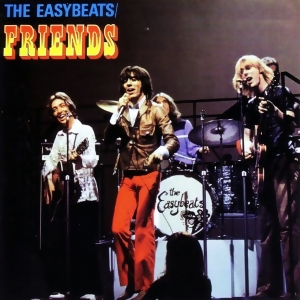
Friends is the sixth and final studio album by Australian rock band the Easybeats. It was released in early 1970 as part of the group's new recording contract with Polydor Records. It would be the only album Polydor released of the band as they broke up before its release.

Vanda & Young were an Australian songwriting and producing duo composed of Harry Vanda and George Young. They performed as members of 1960s Australian rock group the Easybeats where Vanda was their lead guitarist and backing singer and Young was their rhythm guitarist and backing singer. Vanda & Young co-wrote most of the Easybeats' later hits including their international hit "Friday on My Mind" and they were the record producers for the group from 1967. Young was the older brother of Malcolm and Angus Young of the hard rock band AC/DC and also the record producer behind several of the band's biggest albums.
"Bring a Little Lovin'" is a song written by Harry Vanda and George Young of the Australian rock group The Easybeats. The song was written for the Spanish band Los Bravos. Their version was released as a single in April 1968 and reached number fifty-one on the Billboard Hot 100 in the United States.

Good Friday is the fourth studio album by The Easybeats, released in May 1967. It was the first album released after the band signed an international recording deal with United Artists Records. The original UK album was released in May 1967. Although "Friday on My Mind" was a big single in the UK, the album failed to make the top 40.
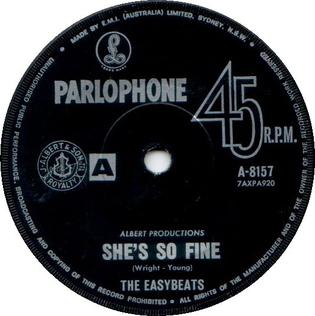
"She's So Fine" is a song written by Stevie Wright and George Young. It was originally recorded by the Australian rock group the Easybeats in 1965, whose version reached number three in the Australian charts.

"The Music Goes 'Round My Head" is a 1967 song and single by Australian rock group The Easybeats, which was written by band members George Young and Harry Vanda.

"For My Woman" is a song by Australian rock band the Easybeats, written by singer Stevie Wright and guitarist George Young. The Easybeats had formed in Sydney in 1964, with a sound inspired by the Pretty Things and the Rolling Stones. After signing with their manager Mike Vaughan, he introduced the band to producer and businessman Ted Albert, who liked them enough to sign with his company Albert Productions in December 1964. The song was recorded in January 1965 at the 2UW Theatre in Sydney as a demo together with three other songs.

"Peculiar Hole in the Sky" is a song written by Harry Vanda and George Young. It was originally recorded by the Australian rock group the Easybeats in 1967, but left unreleased until 1969. The song would later be given to Australian rock group, The Valentines, which included singer Bon Scott, who would later join George Young's brothers Malcolm Young and Angus Young in AC/DC. The Valentines version would be released in August 1968.
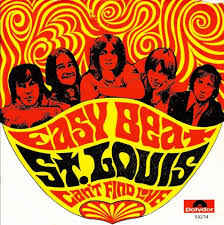
"St. Louis" is a song by Australian rock group the Easybeats, which was released in June 1969. It was co-written by its members Harry Vanda and George Young and recorded as their first single after signing to Polydor Records.

"Come and See Her" is a song written by Stevie Wright and George Young. It was released as the sixth single for their Australian rock group the Easybeats in April 1966, which reached No. 3 on the Australian charts. It was the group's debut single in the United Kingdom, issued on the United Artists Records in July.
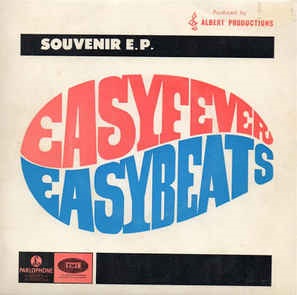
Easyfever by Australian rock and roll group the Easybeats was their fourth official extended play. It was issued to coincide with the band's departure for the United Kingdom. It appeared in August 1966 and reached number one on the Australian singles charts, something that had only been achieved once before by an EP. The songs on the EP did not appear on any of the Easybeats' official studio albums, however, they were included as bonus tracks on the 1992 CD reissue of their It's 2 Easy album.

















